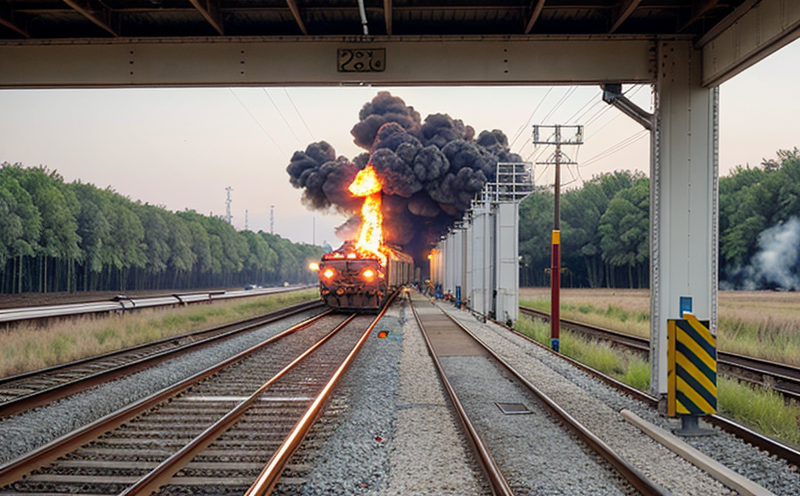Fire Safety in Rail Operations: A Comprehensive Guide
The rail industry is a critical component of modern transportation, connecting cities, towns, and countries across the globe. However, with the increasing demand for efficient and reliable services, the risk of fire safety breaches also rises. Fire safety is an essential aspect of rail operations, requiring diligent attention to prevent accidents and ensure passenger safety.
Rail networks are complex systems comprising various components such as locomotives, wagons, signals, and infrastructure. Each component poses a unique set of fire risks, which must be mitigated through regular maintenance, inspections, and adherence to established protocols. This article delves into the importance of fire safety in rail operations, providing an overview of key concepts, best practices, and regulatory requirements.
Key Concepts in Fire Safety
Fire Hazard Identification: Identifying potential fire hazards is the first step towards mitigating risk. These include electrical malfunctions, mechanical failures, and human error.
Electrical malfunctions: Faulty wiring, short circuits, or overheated equipment can lead to fires.
Regular inspections of electrical systems are crucial to detect and rectify issues before they escalate into a full-blown fire.
Maintenance personnel should be trained to identify potential electrical hazards and take corrective action promptly.
Mechanical failures: Overheated brakes, faulty bearings, or worn-out equipment can ignite flammable materials.
Regular lubrication, inspections, and replacement of worn-out components are essential to prevent mechanical failures.
Operators should be aware of the warning signs of potential mechanical issues and report them promptly to maintenance personnel.
Fire Prevention Measures: Implementing fire prevention measures is vital to reduce the risk of fires occurring in the first place. These include:
Regular Maintenance: Schedule regular inspections, maintenance, and repairs to ensure equipment is functioning correctly.
Maintenance records should be kept up-to-date to track the history of equipment and identify potential issues before they become critical.
Train operators should be aware of the importance of reporting any issues or concerns to maintenance personnel promptly.
Fire-Resistant Materials: Use fire-resistant materials for new builds, renovations, or repairs to minimize the risk of fires spreading rapidly.
Fire-resistant materials can slow down or prevent the spread of a fire, giving occupants more time to evacuate safely.
Train operators should be aware of the types of materials used in their trains and take steps to maintain them properly.
Fire Detection and Suppression Systems
Fire Detection Systems: Implementing fire detection systems is essential for early warning and response to fires. These include:
Smoke Detectors: Install smoke detectors in critical areas such as engine rooms, crew cabins, and cargo holds.
Regular testing of smoke detectors ensures they are functioning correctly and will detect a potential fire quickly.
Train operators should be aware of the importance of reporting any issues or concerns with smoke detectors to maintenance personnel promptly.
Heat Detectors: Install heat detectors in areas prone to overheating, such as engine rooms and electrical cabinets.
Regular testing of heat detectors ensures they are functioning correctly and will detect a potential fire quickly.
Train operators should be aware of the importance of reporting any issues or concerns with heat detectors to maintenance personnel promptly.
Fire Suppression Systems: Implementing fire suppression systems is essential for containing fires before they spread. These include:
Foam Agents: Install foam agents in cargo holds and engine rooms to suppress fires involving flammable liquids or gases.
Regular testing of foam agents ensures they are functioning correctly and will suppress a potential fire quickly.
Train operators should be aware of the importance of reporting any issues or concerns with foam agents to maintenance personnel promptly.
Clean Agents: Install clean agents in critical areas such as engine rooms, crew cabins, and cargo holds to suppress fires involving electrical equipment.
Regular testing of clean agents ensures they are functioning correctly and will suppress a potential fire quickly.
Train operators should be aware of the importance of reporting any issues or concerns with clean agents to maintenance personnel promptly.
QA Section
1. What is the most common cause of fires in rail operations?
A: Electrical malfunctions are a leading cause of fires in rail operations, accounting for approximately 70 of all rail-related fires.
2. How often should fire detection systems be tested?
A: Fire detection systems, including smoke detectors and heat detectors, should be tested at least once every six months to ensure they are functioning correctly.
3. What is the role of clean agents in fire suppression systems?
A: Clean agents are used to suppress fires involving electrical equipment by displacing oxygen and cooling the surrounding area to prevent re-ignition.
4. How can train operators help prevent fires in rail operations?
A: Train operators play a critical role in preventing fires by reporting any issues or concerns with equipment, including signs of overheating, worn-out components, or electrical malfunctions.
5. What is the importance of fire-resistant materials in new builds, renovations, or repairs?
A: Fire-resistant materials can slow down or prevent the spread of a fire, giving occupants more time to evacuate safely and minimizing damage to equipment and infrastructure.
Conclusion
Fire safety is an essential aspect of rail operations, requiring diligent attention from all stakeholders. Implementing fire prevention measures, regular maintenance, and adherence to established protocols are crucial for preventing fires and ensuring passenger safety. By understanding key concepts in fire safety, including hazard identification, prevention measures, and detection systems, operators can reduce the risk of accidents and create a safer environment for passengers and crew.
Regulatory requirements also play a significant role in maintaining fire safety standards. Operators must be aware of and comply with relevant regulations, such as those governing electrical equipment, mechanical components, and fire suppression systems.
By prioritizing fire safety and adopting best practices outlined in this article, operators can create a safer, more reliable rail network for all users.

































